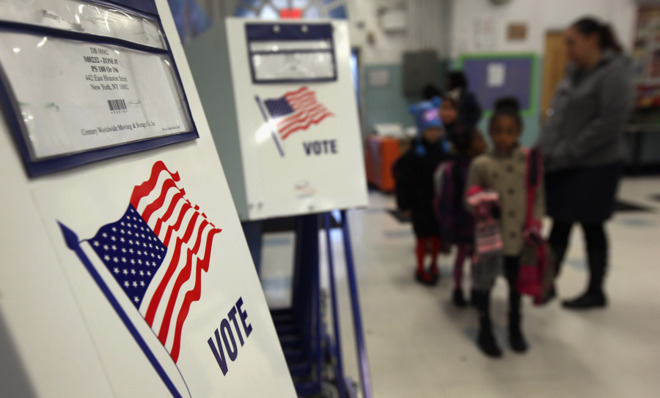4 key insights into the 2014 midterms


A free daily email with the biggest news stories of the day – and the best features from TheWeek.com
You are now subscribed
Your newsletter sign-up was successful
In a new episode of Political Wire's podcast, we spoke with Celinda Lake, the Democratic pollster for the George Washington University Battleground Poll. Lake shared her insights with us on the mood of the electorate and Democrats' turnout challenges as the 2014 midterms approach.
Here are four takeaways:
1. We're in unfamiliar territory when it comes to voters' frustrations with government and the economy: The last time Americans felt this sour about their government was during the Watergate scandal, Lake said. Americans are fed up with both parties, and their frustration with Congress has gotten to the point where voters are even souring to some extent on their own representatives in Congress. "They're not ready to fire their guy yet, but they've definitely put their guy on notice," Lake said. But unlike the Watergate era, Lake said, today's voters are also strongly frustrated with the state of the economy. And this time voters' disgust with government stems not from corruption scandals but from a perception that government is highly polarized and can't get anything done: "It's really hard to imagine, 'Where does this end, where does this come out?'"
The Week
Escape your echo chamber. Get the facts behind the news, plus analysis from multiple perspectives.

Sign up for The Week's Free Newsletters
From our morning news briefing to a weekly Good News Newsletter, get the best of The Week delivered directly to your inbox.
From our morning news briefing to a weekly Good News Newsletter, get the best of The Week delivered directly to your inbox.
2. Democrats need to talk more about jobs. Their focus on the minimum wage isn't a jobs platform: Yes, raising the minimum wage, which many Democrats have proposed as a way to tackle income inequality, polls well with voters. It even gets support from half of Republicans, Lake said. But she cautions: "I think the winning prescription is actually something that Democrats don't talk about right now, and that's jobs." Voters care even more about jobs, she suggested; a recent Battleground poll showed that a far greater fraction of voters wanted President Obama to address jobs/the economy in his State of the Union address than the fraction that wanted him to address income inequality. So while Americans like the idea of raising the minimum wage, "people don't think that's a major jobs platform," Lake said.
3. All signs point toward a midterm electorate that's more friendly to Republicans than in 2012: Historically, turnout tends to favor Republicans in midterm elections anyway. As if that didn't pose enough of a problem for Democrats, Republicans are fired up after the botched rollout of the ObamaCare insurance exchanges, and key Democratic constituencies, namely single women and young people, are "very disengaged," Lake said of the Battleground Poll results. All told, "I think you can expect a much whiter, older electorate in 2014 than you had in 2012 for sure."
4. Energizing young voters will be especially difficult for Democrats: Democrat Terry McAuliffe's campaign organization in the Virginia gubernatorial race was able to get Democratic-leaning single women to the polls in an off-year election, but not the crucial young-voter demographic that helped propel Democrats to the White House in 2008 and 2012. Young voters are discouraged about the state of the economy, the jobs market, and their education costs, Lake said: "I think we could see record-low turnout of young people, frankly." To help boost youth turnout, Democrats need the strong organization and digital operations that Obama's presidential campaigns had, and a greater focus on jobs than Democrats have right now. Democrats also need all the help they can get from voting inducements such as early voting and same-day registration, but Republican-controlled state governments have sought to roll back such initiatives. Another potential tool is ballot initiatives that concern issues that young people strongly care about, such as the minimum wage, student loans and marijuana legalization.
Listen to the entire conversation:
A free daily email with the biggest news stories of the day – and the best features from TheWeek.com
Subscribe to the podcast via iTunes or RSS to get episodes automatically downloaded.
Taegan D. Goddard is the founder of Political Wire, one of the earliest and most influential political websites. He also runs Wonk Wire and the Political Dictionary. Goddard spent more than a decade as managing director and COO of a prominent investment firm in New York City. Previously, he was a policy adviser to a U.S. senator and governor. Goddard is also co-author of You Won — Now What? (Scribner, 1998), a political management book hailed by prominent journalists and politicians from both parties. Goddard's essays on politics and public policy have appeared in dozens of newspapers across the country, including The Washington Post, USA Today, Boston Globe, San Francisco Chronicle, Chicago Tribune, Philadelphia Inquirer, and Christian Science Monitor. Goddard earned degrees from Vassar College and Harvard University. He lives in New York with his wife and three sons.
